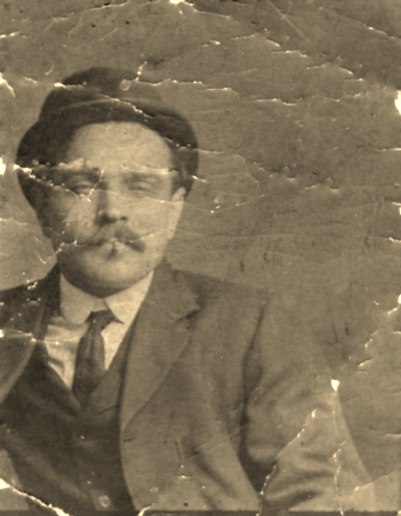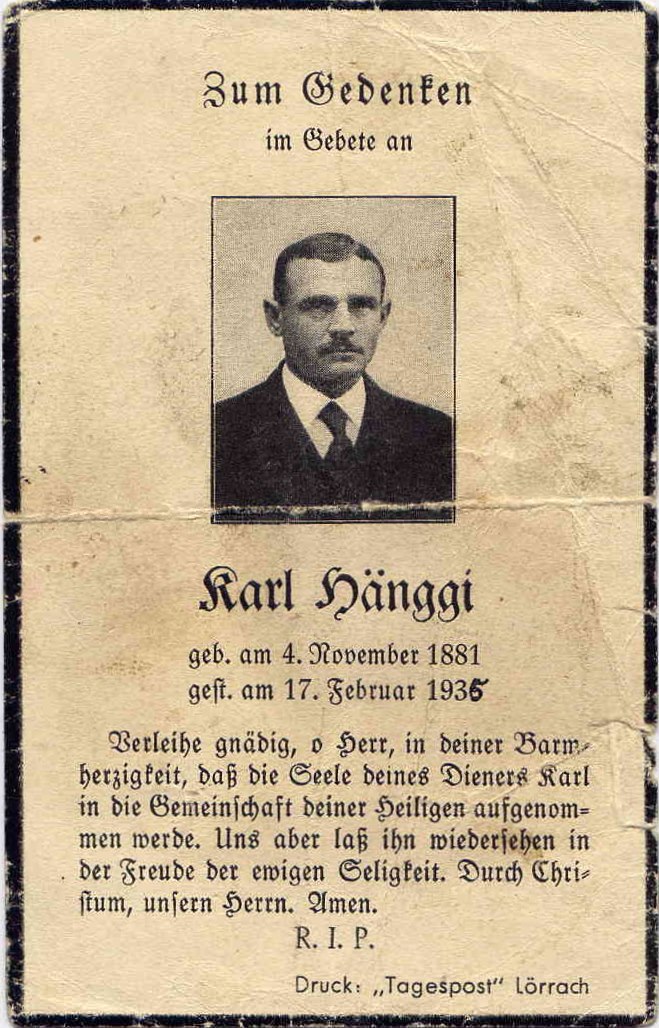Although she was born in London, my mother's ancestry is entirely from continental Europe. Her father, Josef (usually anglicised to Joseph) Hänggi, was from Switzerland and her mother, Anna Elisabeth Kuhn was born in Germany. Both came to England in the late 19th century although what is known about them, and their individual stories, are very different.
Joseph and Anna married in London in 1922, this being a second marriage for Joseph. They lived initially in Huntley Street but acquired a lease on a substantial building in Harrington Square, St Pancras, in early 1924, where they remained for the rest of their married lives and where Anna stayed until the building was demolished in the early 1960s. They took in lodgers, which provided them with an income, and had 4 children in the 6 years following their marriage.
I never knew Joseph as he died in April 1952, 7½ months before I was born although, according to my mother, he knew I was on the way. Anna lived until July 1966 but suffered badly from arthritis in her final years. I knew her from frequent visits to her home in London, but was too young to have thought of asking anything about her past; even if I had, it's doubtful she would have said much as more recent enquiries have demonstrated quite clearly that even her children knew very little about her background.
JOSEF HÄNGGI
Background

My grandfather, Josef Hanggi
Joseph Hänggi was certainly of Swiss origin but exactly where and when he was born remains unknown. The few records that have been found, together with family knowledge, suggest he was born on 29th September in one of the years 1877 to 1879 but which is unclear. It is certain that he was Swiss as he seems to have maintained contacts with the Swiss Embassy in London; his daughters Marie, my mother, and Violet apparently attended a children's party at the Embassy in the 1930s and Marie certainly received an offer to take up Swiss citizenship at around the time of her 21st birthday in 1949. These events indicate that Josef must have remained in contact with the Swiss authorities throughout his life although the process is unknown; the Swiss Embassy in London have been unable to provide any information so far.
The earliest occurrences of the name 'Hänggi' can be traced in Swiss genealogical sources to a few villages in canton Solothurn and Solothurn is a name that was familiar to Joseph's daughters; the villages concerned are Nunningen, Meltingen, Zullwil, Büren and Dulliken, pre-1800. Later 19th century records indicate the award of citizenship to residents in more places, however, these were all, bar one, to people originating in one of Nunningen, Meltingen or Zullwil; these records show the name appearing in Solothurn in 1876, Grindel in 1877, Bellach in 1878 and Basle in 1885, as well as in Fehren at an unspecified 19th century date. There is also an isolated mention in Laupen, canton Bern, in 1861, which does not have a named place of origin. The evidence suggests that the place of greatest occurrence was probably Nunningen, though this is more surmise than fact. Josef also, apparently, made reference to Basle but whether this was a general reference to the canton or a more specific reference to the city is unknown.
A most interesting history of the Hänggi family of Nunningen appears on a web site at http://hanggi-hankey-roy-jonsson-strombeck.com/hanggi1.htm and includes reference to records which indicate that the name first appeared in that village before the mid-16th century and possibly as far back as before the mid-15th; if this is so, it would seem to suggest that all Swiss Hänggis can probably trace their ancestry to Nunningen. There is, however, also a letter that states the first Hänggi in Nunningen was Anthony, who came from Italy in the mid-17th century. It is also said that a very substantial proportion of all the residents in recent times bear the Hänggi name.
Joseph gave his father's name also as Josef on both of his marriage certificates, stating his occupation to have been dairyman on the first and farmer on the second. So far, no relevant birth or baptismal record has been found and, therefore, his background remains hidden. The only other details that are known are that he had a sister named Marie and brother named Karl; family lore says that Marie had 6 children but died young, while Karl is known to have been born in 1881 and died in Lörrach, Southern Germany, in 1935.
The funeral card of my great uncle, Karl Hanggi
It has been suggested that Karl may have had a son whom he wanted to send to live with Joseph's family in the early 1930s, but Joseph refused, however, the evidence for this is only the very vague memories of elderly relatives.
Although it has always been believed that Joseph came to England around the age of 16, no evidence of him can be found in either the 1901 or 1911 censuses. He reportedly told his daughters that he worked as a valet at at least one major London hotel and had some contact with King Edward VII when he was still Prince of Wales; he apparently had some hand in helping a drunken Prince into his carriage after a night out, however, given Joseph's absence from any UK records of the 1890s, this story must be considered very dubious. It could be that his reference to 'the Prince of Wales' was actually a reference to the future Edward VIII, but that would put his probable arrival in England as much later than has previously been believed. There has been a suggestion for his daughter Violet that he may have lived in France for a time before coming to England, and his daughter Marie believed that he may have had some knowledge of Prince's Street, Edinburgh. Whatever the truth, it seems likely that Joseph moved around a bit over a period of a number of years in the late 19th and early 20th centuries.

Return to stories index